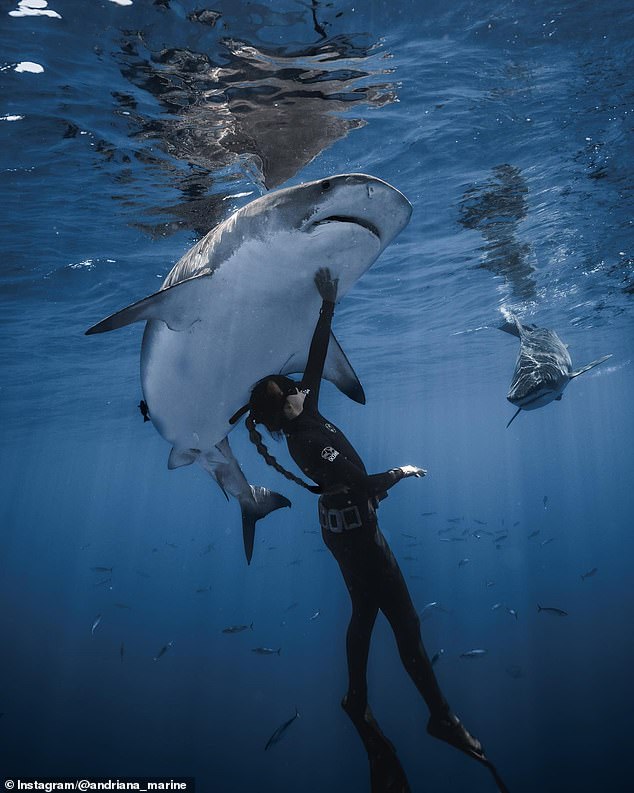
When Andriana Fragola slips into the ocean, she’s not just diving into saltwater.
She’s entering the habitat of some of the world’s most feared and misunderstood creatures – sharks.
Fragola, a 31-year-old marine biologist, conservationist, and shark diver known to her online followers as Andriana Marine, has built a life around challenging the myths that have haunted our cultural consciousness since 1975 – the year Jaws hit theaters and turned the great white shark into a cinematic supervillain.
Now, with Shark Week 2025 kicking off July 20 on Discovery and Max and coinciding with the 50th anniversary of Jaws, Fragola says it’s more important than ever to set the record straight.
‘Jaws, specifically, has done quite a lot of damage for sharks and just the image of sharks,’ Fragola said.
‘It’s something that people are already nervous about – being in the ocean or being in that environment – and then it just amplifies it by making it this shark that’s specifically hunting people. And that is not the case at all.’
However, she does admit to one or two terrifying encounters, including a dive in Hawaii where she was almost savaged by a Tiger shark.
Daily Mail caught up with Fragola to distinguish fact from fiction and get her top tips for avoiding a similar fate.

Known online as Andriana Marine, Andriana Fragola, 31, uses her platform to change how people see sharks

With millions of views on TikTok and Instagram, Fragola hopes to replace fear with fascination
The truth behind the terror
Fragola grew up in Miami, where a childhood love of the ocean led her to snorkeling, scuba diving, and eventually a master’s degree studying sharks at the University of Miami.
Today, she leads shark diving tours, creates educational content for social media, and works with conservation-focused dive operators around the globe – including her latest project in the Maldives, helping design a new tiger shark free diving program.
Still, she’s no stranger to skepticism.
‘People really don’t understand that if that were the case, there would be people every single time you go to the beach – there would be someone there, you know, multiple people getting injured or attacked because they’re in the water all the time,’ she said.
‘In reality, out of the global population, there’s only about 10 human fatalities in the entire world’ due to shark interactions each year.
‘In comparison to how many sharks are killed by people, that’s actually over 100 million sharks killed by people every single year.’
‘If you compare the number between 10 and 100 million, it’s pretty jarring.’

Fragola says movies like Jaws (pictured) turned sharks into villains overnight – and that damage still lingers 50 years later

She said movies like Jaws (pictured) made it seem like sharks are hunting people ‘but that’s not the case at all’

Fragola calls Jaws ‘pretty off-base,’ saying it planted an irrational fear that still shapes how people see sharks today
Could Jaws actually happen?
Not according to Fragola.
‘I think it’s pretty off-base with sharks,’ she said. ‘Sharks are attracted to splashing because when something’s injured or dying at the surface, it’s usually splashing or thrashing around.’
But the image of a relentless man-eating predator? Pure Hollywood.
‘In an extremely small chance that could happen, but it’s so, so unlikely and so uncommon that a shark would continue to try to attack a person. So I would say it’s pretty off-base.’
Even Shark Week, she says, sometimes gets it wrong.
‘I think the current image of sharks in pop culture and media and movies still has that really negative image,’ she said.
‘Unfortunately, a lot of times movies are still bringing up the drama… Even a series like Shark Week, they do often still dramatize the most crazy thing with sharks or the most intense moment of their behavior.’
‘That’s maybe like five percent of what they do in a day. It’s really, really different from what’s actually happening and the way that sharks are actually behaving every single day.’

Fragola comes face-to-face with a tiger shark in Hawaii, where she regularly leads guided dives

‘They’re not monsters,’ says Fragola, who’s spent thousands of hours in the water with sharks
Beauty and power, side by side
Despite spending thousands of hours in the water with sharks, Fragola says she’s never been bitten. That doesn’t mean every dive is peaceful.
‘I have definitely had encounters where the sharks have been either really competitive – whether that’s because there’s baitball and they’re feeding, or a situation where they’re just being competitive with each other,’ she said. ‘Sometimes that can get really heated and escalated.’
But those moments are the exception, not the rule – and they’re part of what makes sharks so remarkable.
‘Specifically with the tigers that I work with in Hawaii, there’ll be moments where the same shark is extremely intense – and she’s tried to bite me before,’ Fragola said. ‘But it’s really displaced aggression when it comes to the other sharks in the area, and she’s just frustrated.’
‘An hour later, it’s just completely beautiful – super soft-touching, when I have to push her away – very curious. Seeing the same power in the one shark, where it’s super incredibly peaceful, and then completely strength in the other side of it – I think is really beautiful.’
What to do if you see a shark
It’s the summer beachgoer’s worst-case scenario: spotting a fin near the shore. But Fragola says the solution is simpler – and calmer – than most would expect.
‘The best thing to do is just to remain calm,’ she said. ‘If you do want to get out of the water, just slowly kind of back out of it – that way you can keep an eye on the shark while getting out.’
‘Any type of screaming and splashing, they can feel the vibrations of all of that, and it’s definitely going to make them more interested in pursuing you or just checking you out.’
‘Honestly, standing still is probably the best thing.’
If you’re in the water and a shark is curious, eye contact is key.
‘You want to look like a predator,’ she said. ‘You’re going to stand your ground and show the animal that you see it – show the shark that you see it – by making eye contact and continuing to look around, just in case there’s any other sharks in the area.’
‘And then if the shark ever continued to approach you… you could push down on the top of the head and push it away from you. That’s like last-case scenario.’

Shark diver Andriana Fragola gently redirects a curious shark during a free dive – a safety move that often draws criticism online

Fragola says making eye contact and staying calm are key to safe shark encounters
Changing minds and facing critics
Through her videos, Fragola documents not just the beauty of sharks, but the transformational experience of diving with them – especially for first-timers.
‘I’ve been able to have people in the water and see sharks, and see the reaction they have when they’re getting on the boat and they’re terrified and nervous,’ she said.
‘And then the reaction afterwards, when they have a little bit more understanding of the behavior and how different it is from the perception that they had.’
Still, not everyone is supportive. Some critics accuse her of interfering with nature – especially when she redirects a shark with her hand.
‘It’s when people say not to touch them, and it’s like – the shark is approaching and I have to redirect in the sense for safety. I can’t just let the shark run into my chest,’ she said.
‘If I didn’t touch the shark to move it away from me, there’s a potential it could bump into me or even bite me – and then that is going to create a whole negative slew of videos and things that people would share about someone getting hit by a shark. And that’s the opposite of what I would ever want to happen.’
Fragola also believes gender plays a role in the backlash.
‘I get more negative comments because of being a woman,’ she said. ‘I’ll see a post that’s really similar that a man posts, and then a post I post… they could be very similar in content, and then the comments and reaction are completely different.’

Fragola is currently developing a tiger shark snorkeling program in the Maldives to promote safe, respectful encounters

The marine biologist says even ‘tough’ sharks can be peaceful and gentle
The real threat
While fear of sharks still dominates headlines, Fragola says the real threat is going largely unnoticed – and it’s on our plates.
‘A lot of sharks are caught as bycatch from fisheries, and unfortunately they don’t – a lot of times they don’t even use the sharks,’ she explained. ‘They’re just thrown back in the ocean.’
‘And most of the time, because there’s so much gear to bring in, the sharks that were caught usually are dead.’
Her advice?
‘Probably the number one way you can help sharks is honestly not eating seafood at all,’ Fragola said. ‘But if you’re going to eat seafood, just really minimize it, or try to get it from a fisherman that’s local and you have a more direct source. If you don’t know where it’s coming from, it’s better not to eat it.’
‘Even though it’s not a shark fishery, when they’re setting out big long-line fishery or gill net fishery, they’re setting out all of this gear… and unfortunately, it’s so much gear that it catches a lot – dolphins and turtles and other sea birds, sea lions, things like that.’
‘So if you want to help the ocean in general – that’s my number one thing.’






